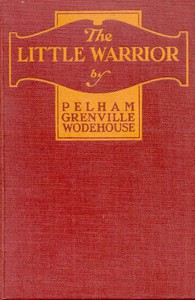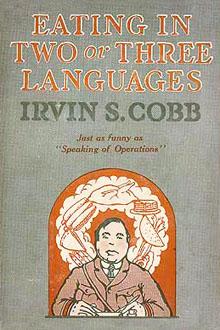The Little Warrior by P. G. Wodehouse (top 50 books to read txt) 📗

- Author: P. G. Wodehouse
Book online «The Little Warrior by P. G. Wodehouse (top 50 books to read txt) 📗». Author P. G. Wodehouse
Uncle Chris digested this information in silence for a moment. He pulled at his short mustache.
“Why, of course!” he said at length. Jill, who know him so well, could tell by the restored ring of cheeriness in his tone that he was himself again. He had dealt with this situation in his mind and was prepared to cope with it. The surmise was confirmed the next instant when he rose and stationed himself in front of the fire. Mr Pilkington detested steam-heat and had scoured the city till he had found a studio apartment with an open fireplace. Uncle Chris spread his legs and expanded his chest. “Of course,” he said. “I remember now that you told me in your letter that you were thinking of going on the stage. My niece,” explained Uncle Chris to the attentive Mr Pilkington, “came over from England on a later boat. I was not expecting her for some weeks. Hence my surprise at meeting her here. Of course. You told me that you intended to go on the stage, and I strongly recommended you to begin at the bottom of the ladder and learn the ground-work thoroughly before you attempted higher flights.”
“Oh, that was it?” said Mr Pilkington. He had been wondering.
“There is no finer training,” resumed Uncle Chris, completely at his ease once more, “than the chorus. How many of the best-known actresses in America began in that way! Dozens. Dozens. If I were giving advice to any young girl with theatrical aspirations, I should say ‘Begin in the chorus!’ On the other hand,” he proceeded, turning to Pilkington, “I think it would be just as well if you would not mention the fact of my niece being in that position to Mrs Waddesleigh Peagrim. She might not understand.”
“Exactly,” assented Mr Pilkington.
“The term ‘chorus’…”
“I dislike it intensely myself.”
“It suggests …”
“Precisely.”
Uncle Chris inflated his chest again, well satisfied.
“Capital!” he said. “Well, I only dropped in to remind you, my boy, that you and your aunt are dining with me tonight. I was afraid a busy man like you might forget.”
“I was looking forward to it,” said Mr Pilkington, charmed at the description.
“You remember the address? Nine East Forty-First Street. I have moved, you remember.”
“So that was why I couldn’t find you at the other place,” said Jill. “The man at the door said he had never heard of you.”
“Stupid idiot!” said Uncle Chris testily. “These New York hall-porters are recruited entirely from homes for the feeble-minded. I suppose he was a new man. Well, Pilkington, my boy, I shall expect you at seven o’clock. Goodbye till then. Come, Jill.”
“Good-bye, Mr Pilkington,” said Jill.
“Good-bye for the present, Miss Mariner,” said Mr Pilkington, bending down to take her hand. The tortoiseshell spectacles shot a last soft beam at her.
As the front door closed behind them, Uncle Chris heaved a sigh of relief.
“Whew! I think I handled that little contretemps with diplomacy! A certain amount of diplomacy, I think!”
“If you mean,” said Jill severely, “that you told some disgraceful fibs …”
“Fibs, my dear,—or shall we say, artistic mouldings of the unshapely clay of truth—are the … how shall I put it?… Well, anyway, they come in dashed handy. It would never have done for Mrs Peagrim to have found out that you were in the chorus. If she discovered that my niece was in the chorus, she would infallibly suspect me of being an adventurer. And while,” said Uncle Chris meditatively, “of course I am, it is nice to have one’s little secrets. The good lady has had a rooted distaste for girls in that perfectly honorable but maligned profession ever since our long young friend back there was sued for breach of promise by a member of a touring company in his sophomore year at college. We all have our prejudices. That is hers. However, I think we may rely on our friend to say nothing about the matter … But why did you do it? My dear child, whatever induced you to take such a step?”
Jill laughed.
“That’s practically what Mr Miller said to me when we were rehearsing one of the dances this afternoon, only he put it differently.” She linked her arm in his. “What else could I do? I was alone in New York with the remains of that twenty dollars you sent me and no more in sight.”
“But why didn’t you stay down at Brookport with your Uncle Elmer?”
“Have you ever seen my Uncle Elmer?”
“No. Curiously enough, I never have.”
“If you had, you wouldn’t ask. Brookport! Ugh! I left when they tried to get me to understudy the hired man, who had resigned.”
“What!”
“Yes, they got tired of supporting me in the state to which I was accustomed—I don’t blame them!—so they began to find ways of making me useful about the home. I didn’t mind reading to Aunt Julia, and I could just stand taking Tibby for walks. But, when it came to shoveling snow, I softly and silently vanished away.”
“But I can’t understand all this. I suggested to your uncle—diplomatically—that you had large private means.”
“I know you did. And he spent all his time showing me over houses and telling me I could have them for a hundred thousand dollars cash down.” Jill bubbled. “You should have seen his face when I told him that twenty dollars was all I had in the world!”
“You didn’t tell him that!”
“I did.”
Uncle Chris shook his head, like an indulgent father disappointed in a favorite child.
“You’re a dear girl, Jill, but really you do seem totally lacking in … how shall I put it?—finesse. Your mother was just the same. A sweet woman, but with no diplomacy, no notion of handling a situation. I remember her as a child giving me away hopelessly on one occasion after we had been at the jam-cupboard. She did not mean any harm, but she was constitutionally incapable of a tactful negative at the right time.” Uncle Chris brooded for a moment on the past. “Oh, well, it’s a very fine trait, no doubt, though inconvenient. I don’t blame you for leaving Brookport if you weren’t happy there. But I wish you had consulted me before going on the stage.”
“Shall I strike this man?” asked Jill of the world at large. “How could I consult you? My darling, precious uncle, don’t you realize that you had vanished into thin air, leaving me penniless? I had to do something. And, now that we are on the subject, perhaps you will explain your movements. Why did you write to me from that place on Fifty-Seventh Street if you weren’t there?”
Uncle Chris cleared his throat.
“In a sense … when I wrote … I was there.”
“I suppose that means something, but it’s beyond me. I’m not nearly as intelligent as you think, Uncle Chris, so you’ll have to explain.”
“Well, it was this way, my dear. I was in a peculiar position you must remember. I had made a number of wealthy friends on the boat and it is possible that—unwittingly—I gave them the impression that I was as comfortably off as themselves. At any rate, that is the impression they gathered, and it hardly seemed expedient to correct it. For it is a deplorable trait in the character of the majority of rich people that they only—er—expand,—they only show the best and most companionable side of themselves to those whom they imagine to be as wealthy as they are. Well, of course, while one was on the boat, the fact that I was sailing under what a purist might have termed false colors did not matter. The problem was how to keep up the—er—innocent deception after we had reached New York. A woman like Mrs Waddesleigh Peagrim—a ghastly creature, my dear, all front teeth and exuberance, but richer than the Sub-Treasury—looks askance at a man, however agreeable, if he endeavors to cement a friendship begun on board ship from a cheap boarding-house on Amsterdam Avenue. It was imperative that I should find something in the nature of what I might call a suitable base of operations. Fortune played into my hands. One of the first men I met in New York was an old soldier-servant of mine, to whom I had been able to do some kindnesses in the old days. In fact—it shows how bread cast upon the waters returns to us after many days—it was with the assistance of a small loan from me that he was enabled to emigrate to America. Well, I met this man, and, after a short conversation, he revealed the fact that he was the hall-porter at that apartment-house which you visited, the one on Fifty-Seventh Street. At this time of the year, I knew, many wealthy people go south, to Florida and the Carolinas, and it occurred to me that there might be a vacant apartment in his building. There was. I took it.”
“But how on earth could you afford to pay for an apartment in a place like that?”
Uncle Chris coughed.
“I didn’t say I paid for it. I said I took it. That is, as one might say, the point of my story. My old friend, grateful for favors received and wishing to do me a good turn consented to become my accomplice in another—er—innocent deception. I gave my friends the address and telephone number of the apartment-house, living the while myself in surroundings of a somewhat humbler and less expensive character. I called every morning for letters. If anybody rang me up on the telephone, the admirable man answered in the capacity of my servant, took a message, and relayed it on to me at my boarding-house. If anybody called, he merely said that I was out. There wasn’t a flaw in the whole scheme, my dear, and its chief merit was its beautiful simplicity.”
“Then what made you give it up? Conscience?”
“Conscience never made me give up anything,” said Uncle Chris firmly. “No, there were a hundred chances to one against anything going wrong, and it was the hundredth that happened. When you have been in New York longer, you will realize that one peculiarity of the place is that the working-classes are in a constant state of flux. On Monday you meet a plumber. Ah! you say, A plumber! Capital! On the following Thursday you meet him again, and he is a car-conductor. Next week he will be squirting soda in a drug-store. It’s the fault of these dashed magazines, with their advertisements of correspondence courses—Are You Earning All You Should?—Write To Us and Learn Chicken-Farming By Mail … It puts wrong ideas into the fellows’ heads. It unsettles them. It was so in this case. Everything was going swimmingly, when my man suddenly conceived the idea that destiny had intended him for a chauffeur-gardener, and he threw up his position!”
“Leaving you homeless!”
“As you say, homeless—temporarily. But, fortunately,—I have been amazingly lucky all through; it really does seem as if you cannot keep a good man down—fortunately my friend had a friend who was janitor at a place on East Forty-First Street, and by a miracle of luck the only apartment in the building was empty. It is an office-building, but, like some of these places, it has one small bachelor’s apartment on the top floor.”
“And you are the small bachelor?”
“Precisely. My friend explained matters to his friend—a few financial details were satisfactorily arranged—and here I am, perfectly happy with the cosiest little place in the world, rent free. I am even better off than I was before, as a matter of fact, for my new ally’s wife is an excellent cook, and I have been enabled to give one or two very pleasant dinners at my new home. It lends verisimilitude to the thing if you can entertain a little. If you are never in when people call, they begin to wonder. I am giving dinner to your friend Pilkington and Mrs Peagrim there tonight. Homey, delightful, and infinitely cheaper than a restaurant.”
“And what will you do when the real owner of the place walks in in the middle of dinner?”
“Out of the question. The janitor informs me that he left for England some weeks ago, intending to make a stay of several months.”
“Well, you certainly think of everything.”
“Whatever success I may have achieved,” replied Uncle Chris, with the dignity of a Captain of Industry confiding in an interviewer, “I attribute to always thinking of everything.”
Jill gurgled with laughter. There was that about her uncle which always acted on her moral sense like an opiate, lulling it to sleep and preventing it from rising up and becoming critical. If he had stolen a watch and chain, he would somehow have succeeded in convincing her that he had acted for the best under the dictates of a benevolent altruism.
“What success have you achieved?” she asked, interested. “When you





Comments (0)